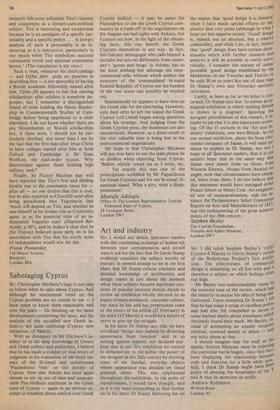Letters
Tito in Academe
Sir: I have every sympathy with Aleksa Djilas (13 March) but methinks he doth protest too much. True, there were aspects of life in Tito's Yugoslavia at which democratic purists might conceivably cavil, as The Times — then described as the twopenny edition of the Daily Worker commented at the time of the first postwar Yugoslav elections. But Tito, though he was Stalin's most loyal ally until the latter kicked him in the teeth in 1948, was no Stalin himself. The Cominform's breach with Yugoslavia was admittedly none of Tito's doing but when it occurred his reac- tion made him an historical figure of enor- mous significance. He was the first to show that the monolithic communist bloc was a sham and a cover for Soviet imperialism which was not prepared to tolerate any potential rival, however loyal he might be.
I should like to refer Aleksa to his father, Milovan Djilas's, book Druienje s Titom (`Association with Tito') which Aleksa himself published a few months ago. In it Djilas pe re writes (on p.6): 'For Tito whatever you may think of his achievements and personality — is one of the most consummate, if not one of the most complex, and enigmatic politicians not only in our own time and not only as far as our restricted and immature Balkan cir- cumstances are concerned. His stormy and
meteoric life-story enhances Tito's interest and uniqueness as a literary-cum-political subject. Tito is interesting and exceptional because he is an amalgam of a specific per- sonality and a specific policy . . . A literary analysis of such a personality is as in- teresting as it is instructive, particularly in our epoch when Tito symbolises national communist revolt and national communist heresy.' (The translation is my own.)
Such a man, whatever his shortcomings — and Djilas pere pulls no punches in describing him — is not unworthy of having a British academic fellowship named after him. Djilas fils appears to feel that naming scholarships after soldiers is somehow im- proper, but I remember a distinguished friend of mine holding the Smuts Reader- ship in Commonwealth Studies at Cam- bridge before being appointed to a chair elsewhere. I do not know whether there are any Mountbatten or Wavell scholarships but, if there were, I should not be par- ticularly shocked, any more than I am by the fact that the first man after Jesus Christ to have colleges named after him at both Oxford and Cambridge is Sir Isaac Wolfson, the mail-order tycoon. Why discriminate against those holding high military rank?
Finally, Sir Fitzroy Maclean may well have reported that Tito's first and abiding loyalty was to the communist cause for — after all — no one doubts that this is true, but he also reported to Churchill soon after being parachuted into Yugoslavia that 'much will depend on Tito, and whether he sees himself in his former role as Comintern agent or as the potential ruler of an in- dependent Yugoslav state' (Disputed Bar- ricade, p.367), and he makes it clear that he (Sir Fitzroy) believed quite early on in his association with Tito that his sturdy sense of independence would win the day.
Frank Pomeranz
110 Manor Avenue, Brockley, London SE4





































 Previous page
Previous page